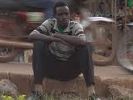Eye For Film >> Movies >> No Place For A Rebel (2017) Film Review
No Place For A Rebel
Reviewed by: Jennie Kermode

In the 30 years since Joseph Kony's rebels first became active in northern Uganda, a lot has changed. Once see as sympathetic many outsiders, the Lord's Resistance Army has become a byword for horror, not simply because of the atrocities its troops have committed but because of its practice of kidnapping and brainwashing children, forcing them to fight. It has now been driven out of the country, its remaining soldiers, thought to number just a few hundred, seeking refuge in neighbouring South Sudan, the Democratic Republic of Congo and the Central African Republic. But what happened to the child soldiers? Ariadne Asimakopoulos and Maartje Wegdam's documentary tries to find out.
It introduces Opono Opondo, who was abducted from his village when young and rose through the ranks of the LRA to become a commander. Eventually he managed to flee, taking advantage of a government amnesty to go home. But life is not - cannot be - the way it was. People in the village are afraid of him. They can imagine something of what he's done, and they don't know if they can trust him. Relatives do what they can, a younger brother's cheerful engagement hinting at a friendship that might have been, but he feels isolated, on the fringes of civilian life, perhaps forever an outcast.

Of course, he's not the cute child he was when he was taken. People find it harder to make allowances for an adult, no matter his past. As the film makes clear, he's still dealing with the psychological legacy of what happened, and perhaps always will be. His sleep is troubled by nightmares and he struggles to find peace during the day. What's more, he's been institutionalised. In the LRA he always had companionship and there was always somebody to tell him what to do. He finds it emotionally taxing to be in charge of his own life.
Asimakopoulos comes from an academic background and knew the subject well before approaching this. Her experience with child soldiers shows in the gentle yet effective way Opono is persuaded to open up. The film is never pushy when it comes to the worst of what happened in the bush, and the fact it's only hinted at makes its monstrous effect on him all the clearer. Meanwhile, the presence of another survivor, one of his few friends, serves as a reminder that every response to trauma is different.
Though it's observational in style and invites viewers to establish context from what it shows rather than adding convenient explanations, No Place For A Rebel is effective in outlining the complicated nature of the situation. With Kony treated as a monster by Western media as if he came out of nowhere, it's useful to hear criticism of the government's approach to the war, and to be reminded that for most civilians it's war itself that is the biggest problem. As Opono walks around the streets, we see daily life going on around him and understand something of the normalcy he longs for. He observes that he's always tense when he's out walking, always ready for a fight, and says with a mixture of protectiveness and envy that those people don't think in that way.
An intimate portrait of survival and what happens afterwards, No Place For A Rebel is interesting and engaging all the way through to its rather abrupt and downbeat ending.
Reviewed on: 20 Oct 2017

















